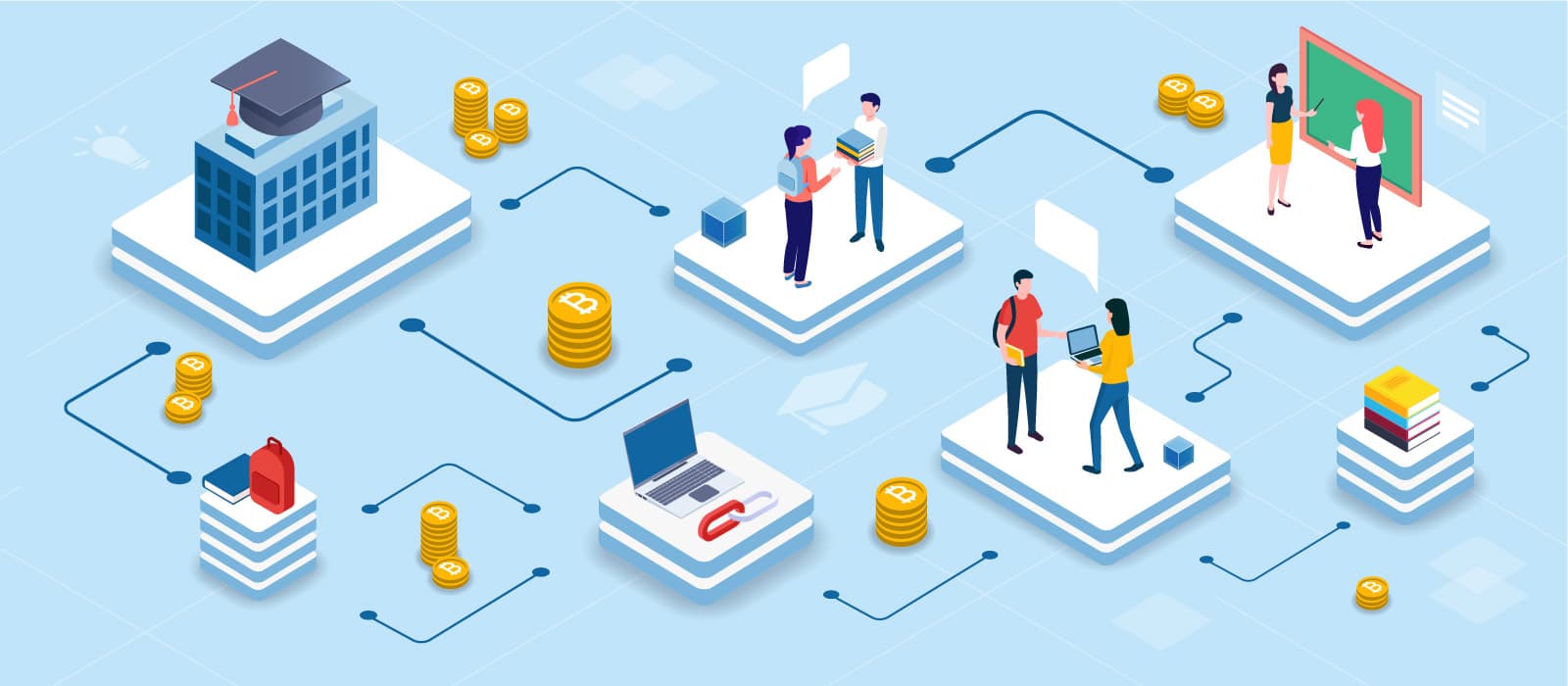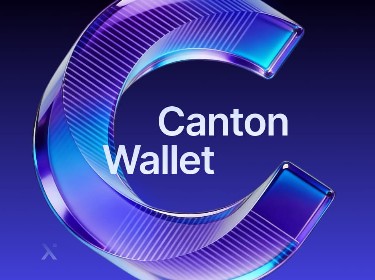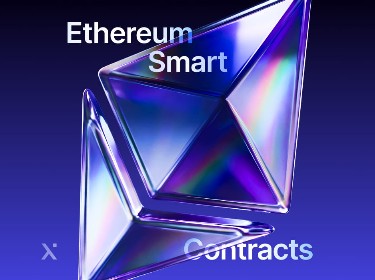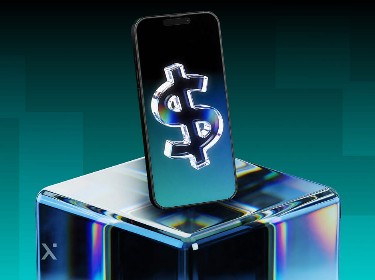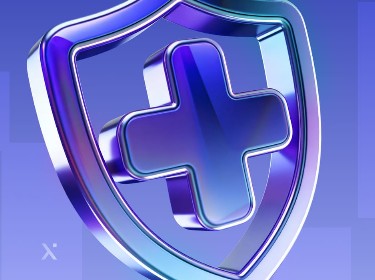Full accessibility of knowledge, streamlined management, and creating more incentives to learn through gamification and rewards are among the achievements of educational institutions that are embracing blockchain technology. Schools, Colleges, and Universities must take their first steps to innovation and integrate blockchain if they are to survive in such a competitive environment.
Just as the other emerging technologies like artificial intelligence, IoT, and extended reality, blockchain technology has been breaking boundaries and introducing cross-industry solutions that go beyond its initial financial and cryptocurrency focus. Its main strengths are its features that allow decentralized storage, the immutability of stored information, traceability, and transparency. These qualities make blockchain an ideal solution for applications such as supply chain management, healthcare data sharing, and secure identity verification. Moreover, integrating blockchain with AI can further enhance data security and provide real-time analytics for smarter decision-making. AI development services complement blockchain solutions by enabling intelligent automation, predictive insights, and advanced data processing across various use cases.
Out of the scope of facilitating secure transactions, these advantages allow for creating complex ecosystems where users openly collaborate, exchange data, engage in agreements, and are incentivized to achieve better results by earning rewards in cryptocurrency. Education is one of the top industries that is expanding and growing and yet facing challenges due to inefficiency of the traditional educational models, limited access to credentials and educational records, and the validity of transcripts – problems which could be easily overcome by blockchain-based software.
Blockchain tackles these challenges by storing and providing universal easy access to credentials on a decentralized ledger, optimizing educational processes with smart contracts, and providing the incentive for students to learn with rewards in crypto. Read on to find out more about how introducing blockchain in education brings definite benefits.
What is blockchain?
In simple terms, blockchain is a peer-to-peer distributed ledger that stores information and keeps track of transactions. Each and every member of the blockchain community has its own copy of the information. The information is recorded subsequently into units called blocks and protected by strong cryptography, creating a chain of data. Changes to blocks are not permitted by the blockchain system architecture, so every action and event could be traced to its origins.
A blockchain could store data on agreements between the parties, their credentials, transactions, and any other information presented in a digital form. Since this information is distributed and highly secured, any attempt at fraudulent activity can be seen by the members of the blockchain community. This creates trust and transparency for any type of ecosystem that the blockchain is integrated into.
How does blockchain work?
Blockchain is a platform that ensures the integrity of the information stored and maintains interactions between the members of the ecosystem. Here’s a high-level overview of the way it works:
- Each member maintains their own blockchain node with the full history of all the events and data appended to the network, including credentials, identities, certificates, etc.
- Every update to the network entails the creation of a new block at the end of the chain. A blockchain protocol dictates how these blocks are recorded, validated, and distributed.
- A consensus mechanism is employed to verify each created block where members of the blockchain network decide if it’s valid to be added to the chain.
- Once a block is created and confirmed, it can not be revoked. All entries on the blockchain are permanent and securely stored. This allows for members of the community to trace the full history of transactions and any other modifications in the blockchain.
- Smart contracts are a special type of agreement between the members of the network that have the conditions programmed into them, making sure that they are met before each party receives what was agreed upon. Smart contracts eliminate the need for third parties and middlemen to be involved in agreement resolution.
- Transactions in cryptocurrency play a very important part in the blockchain ecosystem, providing the incentive for all members of the community to make valuable contributions and participate in the development of the system as a whole.
These key pillars of blockchain technology lay the foundation for its uses throughout different industries, including in education. It has the potential to create a global environment where learning materials, publications, student credits, and transcripts are easily accessible. It can also introduce new and innovative ways for accountability, incentivization, and communication between teachers, students, and other participants.
How blockchain can overcome education industry challenges
![]()
The education industry faces the same challenges that have been dragging it down for years. This includes inefficient paper-based record-keeping processes, lack of transparency, poor student and teacher accountability, no real motivation for students to learn and perform well in class, and lack of trust in educational merits and academic degrees because of falsification. Blockchain has the capacity to impact education and address these challenges by providing tangible solutions described in detail below.
Enhanced and transparent record-keeping
Using the immutable blockchain storage, the school’s office of the registrar needs to create a student record only once. After that, it becomes accessible to all the participants of the educational system and can even be shared between institutions. Every task, assignment, participation in school and extracurricular activities are appended to the student’s digital record as blocks and viewed in the student’s profile. Thus, teachers, counselors, and school administrators have a bird’s-eye view over their students’ progress.
Aside from maintaining student records, blockchain systems can be used to supervise and facilitate accreditation of schools, colleges, and universities, protect intellectual property rights, and eliminate the falsification of diplomas and transcripts. Blockchain-based educational records can be easily accessed and quickly transferred to other institutions and organizations, including potential employers.
All a student has to do is share a link or their digital address to provide access to their profile. This type of system ensures complete authenticity of credentials and student records as the full history of changes with signatures is stored on the blockchain.
Student accountability powered by smart contracts
Blockchain smart contracts can be used by teachers to enter into digital agreements with students regarding the completion of their tasks. All of the assignment requirements, including the instructions, conditions, due date, and deadlines are spelled out in the agreement. After a student completes the task, meeting all the terms in the agreement, they can be automatically granted access to the next part of the course or receive credit and completion certificate.
Ultimately, smart contracts can play an important role in providing individualized learning within a conventional classroom setup, and also create the motivational element that is missing in traditional education systems.
Incentivizing students and teachers to achieve greater results
Cryptocurrency and tokenized credits can be used to create efficient reward systems to motivate students and encourage teachers to contribute to the educational process by creating new learning material and participating in research. Smart contracts can be programmed to issue awards in cryptocurrency for completed tasks. Teachers will be able to incentivize students even further by giving special credit to high performers.
Ultimately, blockchain technology can take full advantage of the gamification element in modern education and take it to the next level. Tokenized credits could be used to pay off student loans, purchase school supplies, learning materials, and cover other educational expenses. Rewards for completing a certain major and receiving a diploma from the university could significantly decrease the number of students who drop out without the intent of finishing college.
Learning performance tracking and individualization
Thanks to the transparency offered by blockchain data storage, educators have more resources available to monitor and control their students’ performance. While using smart contracts and their output as tools to pinpoint where a student is struggling, schools can offer a fully customized learning environment. Student performance data recorded on a blockchain can be accessed by institutions throughout the school district and used to improve educational practices.
On a global scale, this kind of system could aggregate performance statistics on a district, state, and national level and increase healthy competition among schools, colleges, and universities with the ultimate goal to provide the best level of education.
Introducing verifiable lifetime student transcripts
We all have gone through the troubles of obtaining transcripts from educational institutions. It’s a very time-consuming process involving multiple parties to verify credentials and compile the full academic record. Blockchain could provide students with an online digital transcript available to them anytime they need it. This verifiable student lifetime transcript could contain information on all educational achievements and streamline credential verification, making student transfers between schools much easier.
Providing students with an educational achievement portfolio
An educational blockchain platform can allow students to create their own digital portfolios which would store all their educational merits, such as:
- Obtained majors/minors & degrees
- Experience-proven proficiencies
- Completed course certificates
- Micro-certificates for achievements
- Additional credits and awards
- Testing scores and attendance records.
This portfolio can be openly shared to prove a student’s worthiness of enrollment in a university or sent to an employer by a student looking for a job opportunity. Ultimately, a universal database of potential candidates could be created and the best-performing students could be sought after by companies, creating even more incentive to perform better at school.
Companies providing blockchain solutions for education
![]()
Blockchain applications still remain sparse in the educational sector, mostly because of their strong association with FinTech solutions and cryptocurrency development. However, many innovative startups and global companies are first turning to blockchain consulting to then be able to offer blockchain-supported education services to schools around the globe. Below are some concrete examples.
Blockcerts: educational credentials management
Blockcerts is an open-standard platform created for storage and verification of digital certificates, including academic transcripts and credentials. Its blockchain network can store anything from diplomas to transfer records to grade scores. This creates a universal ecosystem for creating, issuing, viewing, and verifying information on the student’s academic history. Using the platform, universities can be sure of the credibility of student records while potential employers can view the whole student profile, including their awards and achievements, and have a better idea of the candidate’s strengths, capabilities, knowledge, and experience.
APPII: CV builder to showcase verified educational merits to employers
APPII is a career experience verifier and a recruitment platform. Candidates are able to easily craft CVs by adding educational credits, qualifications, achievements, and experience. A blockchain network is used to verify the candidate’s academic credentials by sharing them with the educational institutions. Machine learning is also used to match all the data provided in the CV to job opportunities that require the corresponding skillset. Employers have much more trust in the candidate’s knowledge and experience as this information is verified and protected with blockchain technology and cryptography.
ODEM: educational products and services marketplace
ODEM is a blockchain-based educational online platform that offers affordable learning courses that can be customized to the student’s preferences. Students can directly communicate with academic professionals and agree upon the best learning experience. The platform uses blockchain-enabled payment systems and smart contracts to incentivize and reward students for their educational efforts and motivate teachers to create better courses as well. All of the certificates obtained by students are safely stored on the blockchain. Therefore, they can easily be accessed and shared on social media or provided as proof in digital CVs.
Sony Global Education: digital transcript management
Sony Global Education allows multiple educational institutions to share the achievements of their students on a distributed ledger. The blockchain network acts as storage for the lifetime digital transcript of each student that later can be used during transfers between universities. Sony’s intention is to further develop the platform and build the infrastructure for the next-generation educational ecosystem where both teachers and students collaborate and receive rewards in cryptocurrency.
BitDegree: online education platform with a gamified experience
BitDegree provides online courses focused on software and technology. Students are encouraged to learn with tokenized scholarships. The platform has a gamified environment where learners are each assigned a character and navigate the virtual world by completing quests. Making significant achievements in learning and completing courses gains them rewards and recognition from potential employers also registered on the platform. All academic certificates are stored on the blockchain and accumulated in the student’s profile. Companies who are looking to hire new tech experts with fresh perspectives can follow the students’ progress and offer the best candidate a place on their team.
Disciplina: individualized learning management system
Disciplina uses blockchain technology to keep track of students’ academic progress. Each student is appointed a score based on how well they perform in class, participation in extracurricular activities, and other achievements. Schools and colleges registered on the platform use these scores to individualize the learning process and create special plans for each course. Disciplina also aims to streamline communication between students and teachers and introduce convenient tools for making assessments, ratings, and reviews. Recruitment agencies and employers can also register on the platform to find prospective candidates.
Challenges to incorporating blockchain in education
![]()
Although the advantages of blockchain adoption in the education sector are evident, there is hesitation amongst educators who are reluctant to make the revolutionary change. This is to no surprise as there are several obvious challenges that arise before institutions and keep them from transitioning from their legacy software solutions.
Legacy solutions that are now ingrained into most educational systems can be a strong barrier to blockchain adoption. Many schools rely on offline document management systems and student information systems for record-keeping and storage of educational materials. Institutions have invested huge amounts of funds into creating the infrastructure and setting up this software, integrating it into their processes. Not to mention, the staff has been trained to operate these systems and it could be hard for them to transition to decentralized solutions.
Blockchain’s scalability is one of the major reasons that impede it from being incorporated into such a diverse and massive ecosystem as education. The more data blocks are added to the blockchain, the slower it works, as it starts taking more time to analyze all the data history. Of course, distributed ledger technologies are becoming more scalable nowadays, inventing new ways of increasing the speed of transaction processing, but many potential blockchain users would prefer not to wait, sticking to familiar grounds.
High initial costs is another major reason for blockchain’s slow growth in the education sector as very few decision-makers in the education sector have a clear idea of what blockchain is, and how it can benefit the whole system. What they see are the costs: the cost of changing the environment, setting up the infrastructure, the cost of blockchain development itself, as well as blockchain training for the staff. It could be quite hard to foresee the actual financial benefits of blockchain integration in the long run, which include reduced expenses in management, record-keeping, and additional gains from introducing crypto payments and rewards.
Blockchain Training and Development
Education is where development takes its roots. It is precisely for this reason that this sector has to be the most advanced and educators must constantly be on the lookout for innovation. Blockchain is expected to have a strong impact on education, bringing such advantages as transparency, optimization, and simplification of mundane processes. It offers enhanced record-keeping and stronger incentives for students to learn and acquire new skills.
From elementary schools to universities, from young students to headmasters and college provosts — every participant in the educational landscape can benefit from blockchain integration. With over 17 years of experience in developing transformative software, the PixelPlex smart contract development company offers a professional helping hand as a navigator through the world of blockchain. We can provide a set of comprehensive blockchain training courses and workshops to prepare your executives, staff, and teachers for the transition to decentralized systems.
Our team of blockchain developers, researchers, scientists, and analysts will gladly help you introduce blockchain innovations into your institution. Having worked with top companies worldwide, we are constantly discovering new opportunities for technological growth, and are happy to make our clients a part of that progress. Ask our blockchain experts to help integrate blockchain solutions in your school.
